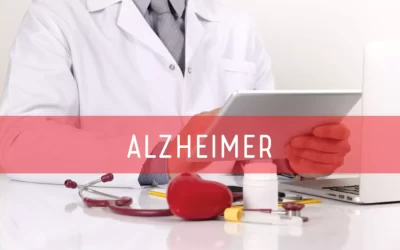Intro
The Future of Alzheimer’s Diagnosis. Alzheimer’s disease is becoming an increasing concern as the world’s population ages. Detection of Alzheimer’s early is crucial for effective treatment and care. Luckily, recent advances in medical science have led to the development of a groundbreaking early Alzheimer’s test that holds immense promise. This innovative tool combines cutting-edge technology to precisely and timely assess cognitive decline, ensuring that improved patient outcomes are achieved through early intervention.
The early Alzheimer’s test detects biomarkers connected explicitly with the disease. By examining cerebrospinal fluid and blood samples, scientists can identify telltale signs such as elevated levels of amyloid-beta and tau proteins. These proteins considered a hallmark of Alzheimer’s pathology, serve as valuable indicators for assessing an individual’s risk of developing dementia or following disease progression.
Alzheimer’s cases are increasing significantly globally, making an early diagnostic test more crucial than ever. This breakthrough tool offers hope for detecting Alzheimer’s disease before significant damage occurs, allowing for timely interventions and customized treatment plans. By seeing cognitive decline early, healthcare professionals can provide personalized care, support, and therapy to improve the quality of life for individuals with Alzheimer’s and their loved ones.
In summary, the development and acceptance of an early Alzheimer’s test represent a significant breakthrough in medical science. By focusing specifically on specific biomarkers, this innovative diagnostic tool facilitates accurate and timely identification of cognitive decline, which results in early intervention and improved patient outcomes. As healthcare practitioners continue to research and refine this test, it holds immense potential for revolutionizing Alzheimer’s care by emphasizing the importance of early detection in the fight against this 300-year-old disease.
Introduction
Alzheimer’s disease, a progressive neurodegeneration disorder, is becoming more challenging as the world’s population ages. Getting an early diagnosis is vital for providing tailored treatment and care. Thankfully, recent advances in medical science have resulted in the development of a groundbreaking early Alzheimer’s test. This innovative tool leverages cutting-edge technology to identify specific biomarkers linked to Alzheimer’s disease. Scientists can detect telltale signs of cognitive decline by examining cerebrospinal fluid or blood samples. Seeing Alzheimer’s pathology early can lead to optimizing patient outcomes. With the incidence of Alzheimer’s increasing, this test provides hope for more effective treatments and a better quality of life for those at risk.

Definition and impact of Alzheimer’s disease
Alzheimer’s disease is primarily a progressive neurodegenerative disorder resulting in cognitive decline, memory loss, and impaired daily functioning. As the world’s population ages, Alzheimer’s disease continues to increase in prevalence, posing an immense challenge for healthcare systems globally. Detecting Alzheimer’s early is crucial as it allows prompt intervention and improved patient outcomes. Recent medical advances have resulted in the development of a groundbreaking early Alzheimer’s test. By analyzing biomarkers in cerebrospinal fluid or blood samples, this innovative diagnostic tool can accurately identify cognitive decline and assess an individual’s risk of acquiring dementia. It holds enormous potential for optimizing treatment and care strategies for Alzheimer’s patients.
Importance of early diagnosis
As the worldwide population ages, Alzheimer’s disease incidence is rising, making early detection crucial for effective treatment and care. An early Alzheimer’s test is regarded as a revolutionary medical science development with promising results. This innovative diagnostic tool holds immense potential for advancing patient outcomes through early intervention. Early diagnosis enables improved management of symptoms, access to appropriate treatments, and the opportunity to plan for the future. By detecting biomarkers linked to the disease, this test can predict an individual’s risk of dementia and monitor disease progression over time.
Current Challenges in Alzheimer’s Diagnosis
The current hurdles in Alzheimer’s diagnosis can be significant in detecting the disease early. Detecting early-stage Alzheimer’s remains complex, as symptoms may be subtle and easily mistaken for typical signs of aging. Diagnostic tools are also constrained, as they rely on observation-based assessments or subjective cognitive tests. These challenges delay diagnosis and prevent early intervention, adversely affecting patient outcomes. Overcoming these obstacles will require advances in diagnostic techniques and the development of reliable biomarkers for early detection. Addressed challenges are crucial to boosting the effectiveness of Alzheimer’s treatment and offering better care to patients.
Difficulty in detecting early-stage Alzheimer’s
The global population’s advancing age has increased in Alzheimer’s disease. Despite this, early diagnosis of this degenerative disorder remains a challenge. The existence of diagnostic tools may struggle to detect early-stage Alzheimer’s, thereby preventing timely intervention and treatment. Researchers and healthcare professionals require a more accurate and efficient method to diagnose Alzheimer’s in its early stages. It is when developing an innovative early Alzheimer’s test becomes imperative. Utilizing cutting-edge technology and biomarker analysis, this pioneering diagnostic tool holds immense potential for enhancing patient outcomes through early intervention and care.
Limitations of existing diagnostic tools
Detecting early-stage Alzheimer’s presents a significant challenge in medical diagnosis. Existing diagnostic tools often have limitations that hinder accurate and timely disease identification. These tools lack the sensitivity required to detect the subtle cognitive decline in the early stages of Alzheimer’s. Due to these limitations, many cases go undiagnosed until the disease has significantly progressed. This delay in diagnosis hampers the effective treatment and impacts patient outcomes. To address this critical need, researchers are developing an innovative early Alzheimer’s test that utilizes cutting-edge technology to overcome these limitations and provide accurate and timely detection.

The Promise of an Early Alzheimer’s Test
The development and testing of an earlier Alzheimer’s test holds immense promise in medical science. By utilizing cutting-edge technology, this pioneering diagnostic tool focuses on detecting specific biomarkers associated with the disease. By analyzing cerebrospinal fluid or serum samples, scientists can identify telltale signs, such as elevated levels of amyloid-beta and tau proteins associated with Alzheimer’s disease. This test allows for accurate and prompt identification of cognitive decline and tracking of the disease progression over time. With the opportunity for early diagnosis, this test is regarded as a promising approach to achieving better patient outcomes and efficacious treatment strategies.
Overview of new diagnostic techniques
As the world population ages, the prevalence of Alzheimer’s disease continues to rise, which makes early detection crucial for effective treatment and care. Recent advancements have led to the development a groundbreaking early Alzheimer’s test that has shown promising results. This innovative diagnostic tool uses cutting-edge technology to detect specific biomarkers indicative of Alzheimer’s disease. By analyzing cerebrospinal fluid or biopsies, scientists can identify telltale signs such as elevated levels of amyloid-beta and tau proteins, regarded as hallmarks of Alzheimer’s disease. This revolutionary method holds immense promise for improving patient outcomes through early intervention, thus offering hope against this life-altering disease.
Potential benefits of early detection
Early detection and treatment of Alzheimer’s disease through an early Alzheimer’s test has enormous potential to yield improved patient outcomes. Identifying cognitive decline earlier can facilitate timely intervention and treatment options, allowing individuals to live a higher quality of life for longer. This early diagnosis also will enable individuals and their families to strategize for the future, making important decisions about care and support. Furthermore, early diagnosis permits better management of symptoms, potentially halting the progression of Alzheimer’s disease and increasing the effectiveness of available treatment options. Overall, developing an early Alzheimer’s test offers hope in the fight against this debilitating condition.
Breakthroughs in Alzheimer’s Research
In recent decades, significant breakthroughs in Alzheimer’s research have occurred, primarily in biomarkers and neuroimaging. These advancements offer new insights into the early detection and diagnosis of Alzheimer’s disease. Researchers have found specific biomarkers, such as elevated levels of amyloid-beta and tau proteins, that are critical indicators of Alzheimer’s pathology. Furthermore, using neuroimaging techniques like PET scans and MRI has enabled the visualization of brain changes related to Alzheimer’s. These breakthroughs provide opportunities for early detection and monitoring of Alzheimer’s, ensuring better treatment outcomes and a better quality of life for those afflicted with the disease.

Role of genetic testing in diagnosing Alzheimer’s
The role played by genetic testing for diagnosable Alzheimer’s disease has emerged as a significant breakthrough in neuroscience. Genetic testing can identify specific genes, such as ApoE4, associated with an increased risk of acquiring Alzheimer’s. By analyzing a person’s DNA, medical experts can derive valuable insights into a person’s susceptibility to this debilitating condition. Moreover, genetic testing can also predict the risk of passing the disease to future generations. This information assists in early detection and intervention, allowing healthcare providers to provide individualized treatment plans and support to patients and their families.
The Impact of Early Diagnosis on Treatment
Early diagnosis and treatment of Alzheimer’s are vital to successful treatment outcomes. Healthcare professionals can provide appropriate interventions and support by identifying Alzheimer’s disease early on. Timely treatment may slow cognitive decline and improve the quality of life for those with Alzheimer’s. Moreover, early diagnosis enables patients and their families to strategize and make informed decisions regarding care options. With the advancement of an earlier Alzheimer’s test, there is hope for improved treatments and a brighter future for those affected by this debilitating disease.
Importance of timely interventions
Timely interventions are crucial in the early detection of Alzheimer’s disease. The global population is aging, increasing the prevalence of this debilitating condition. However, recent advancements offer a gl Blinder of Hope through a pioneering early Alzheimer’s test. By detecting biomarkers commonly seen in Alzheimer’s disease, such as elevated levels of amyloid-beta and tau proteins, this diagnostic tool permits accurate and timely identification of cognitive decline. Early detection enables health professionals to intervene earlier, halting disease progression and improving patient outcomes. The development of an early Alzheimer’s test represents a significant milestone in Alzheimer’s research and treatment.
Potential for disease-modifying treatments
Identifying Alzheimer’s disease early through an innovative early Alzheimer’s test holds immense potential for enhancing patient outcomes. By detecting specific biomarkers relating to the condition, such as elevated levels of amyloid-beta and tau proteins, this cutting-edge diagnostic tool enables prompt interventions and monitoring of disease progression. Having Alzheimer’s disease detected early could result in potentially disease-modifying treatments that could alter the course of the disease. With the worldwide population aging and Alzheimer’s disease prevalence rising, the development of an effective early Alzheimer’s test provides hope in advancing effective treatment and care.
Ethical Considerations and Future Implications
Ethical considerations are significant in developing and deploying early Alzheimer’s testing. As this groundbreaking diagnostic tool expands more widely, it is crucial to address potential concerns such as patient privacy, informed consent, and the potential psychological impact of obtaining an early diagnosis. Furthermore, the future consequences of early Alzheimer’s testing are vast. It could lead to more customized medicine, targeted interventions, and a better quality of life for those diagnosed with Alzheimer’s. Nevertheless, careful consideration should be given to the societal and financial implications of widespread testing and the allocation of resources for early intervention programs.
Ethical concerns surrounding early diagnosis
Developing an earlier Alzheimer’s test raises questions regarding privacy, informed consent, and the potential psychological impact on individuals diagnosed. Confidentiality must remain a top concern, as test results may affect employment, insurance, and social stigma. Informative consent becomes more challenging when diagnosing a disease that has not been definitively treated. Furthermore, there is a possibility of false positives that may cause unnecessary stress and worry. Ethical guidelines must be meticulously established to ensure that the benefits of early detection outweigh any potential harm while prioritizing patient autonomy and well-being.
Role of artificial intelligence in Alzheimer’s diagnosis
Artificial intelligence is crucial for creating an early Alzheimer’s test. AI algorithms can comprehend vast amounts analyzed, enabling them to explore medical information and uncover patterns that might suggest Alzheimer’s disease. By integrating data from biomarker tests, genetic screening, and neuroimaging scans, AI can provide more accurate and reliable predictions of an individual’s risk of acquiring Alzheimer’s. Moreover, AI can be programmed to learn and continually improve its diagnostic capabilities, enabling healthcare professionals to intervene early and improve patient outcomes. The integration of AI in Alzheimer’s diagnosis holds immense potential for advancing research and developing customized treatments. The ultimate goal is to find a cure for this devastating disease.

Conclusion
In conclusion, developing and commercializing an early Alzheimer’s test represents a significant breakthrough in Alzheimer’s research. By utilizing cutting-edge technology and examining specific biomarkers, this innovative diagnostic tool holds immense potential for identifying cognitive decline at its earliest stages. Providing an early diagnosis is essential for effective treatment and care, and this test accurately detects Alzheimer’s pathology. The promise of improved patient outcomes through early intervention is within reach, as this test may pave the way for disease-altering treatments. While ethical considerations and future consequences should be carefully considered, the advent of an early Alzheimer’s test provides hope for those afflicted with this debilitating disease.
Hope for improved treatments and outcomes
The development and implementation of an earlier Alzheimer’s test can serve as a beacon of hope for effective treatments and outcomes in the field of dementia. With the world population aging quickly and Alzheimer’s disease increasing, early detection has become increasingly important. This groundbreaking instrument uses cutting-edge technology to detect specific biomarkers associated with Alzheimer’s disease. By analyzing cerebrospinal fluid or serum samples, scientists can accurately detect signs of cognitive decline, allowing for prompt intervention and individualized treatment plans. This advancement has immense potential to improve patient outcomes and therapeutic approaches for battling Alzheimer’s disease.
The significance of early Alzheimer’s diagnosis
The significance behind an early Alzheimer’s diagnosis cannot be overstated. As the world population ages, the prevalence of this debilitating disease continues to increase. Detection of Alzheimer’s disease early is crucial for effective treatment and care. In recent times, medical science has made significant progress, resulting in multiple breakthroughs. —Developing a groundbreaking early Alzheimer’s test has shown promising results. Researchers can pinpoint cognitive decline by analyzing specific biomarkers in cerebrospinal fluid or blood samples. This innovative diagnosis tool holds immense potential for enhancing patient outcomes through early intervention. With this technique, there is potential for improved treatments and a brighter future for those with Alzheimer’s disease.















0 Comments